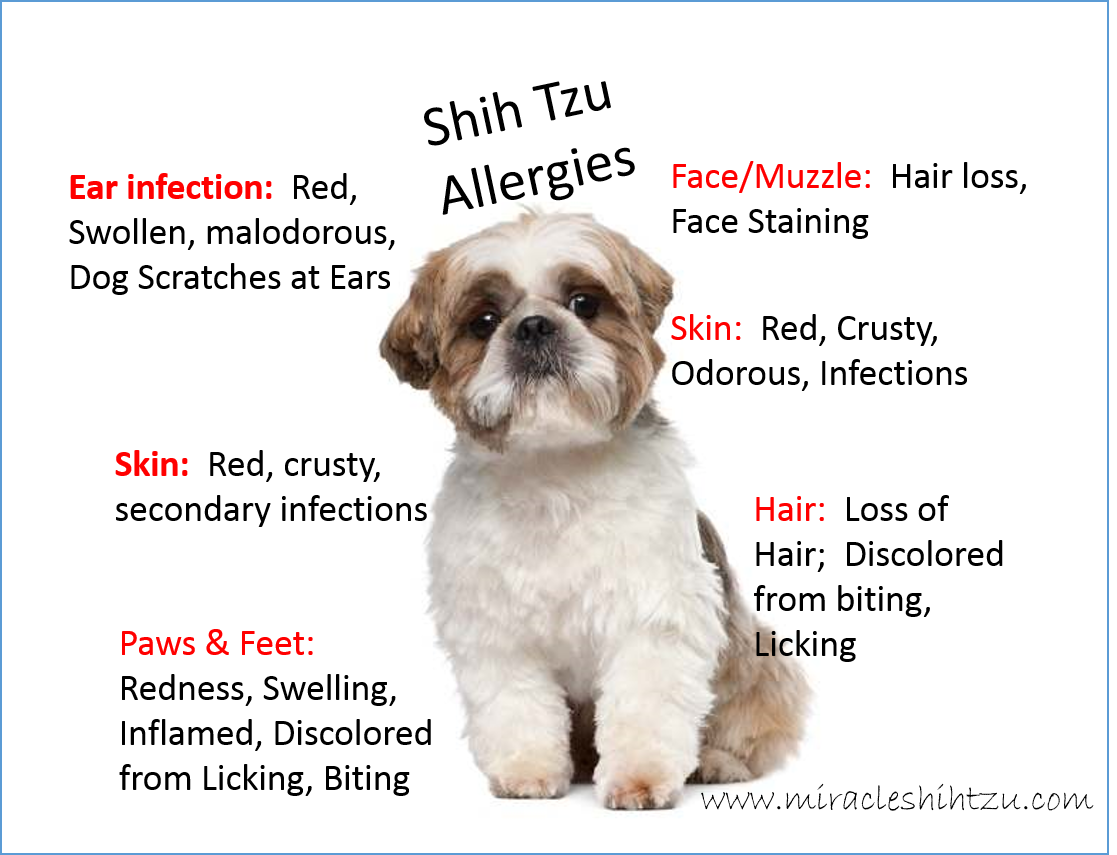Shih Tzus often face skin problems like allergies, hot spots, and infections. Regular grooming and veterinary check-ups can help manage these issues.
Shih Tzus are beloved for their charming personalities and adorable looks, but they can be prone to various skin issues. Owners should remain vigilant about their dog’s skin health to ensure early detection and treatment. Common problems include allergies from food or environment, which can cause itching and irritation.
Hot spots, or localized skin infections, can develop rapidly if not treated promptly. Furthermore, Shih Tzus may suffer from fungal or bacterial infections due to their dense coats and skin folds. Maintaining a consistent grooming routine and providing a balanced diet are essential steps in preventing and addressing these skin concerns effectively.
Common Skin Problems In Shih Tzus
Shih Tzus are adorable and loving companions. However, they often face skin problems. These issues can cause discomfort and pain. Recognizing the signs early can help you manage them effectively.
Signs And Symptoms
It’s important to watch for signs of skin problems. Common symptoms include:
- Itching: Persistent scratching or biting.
- Redness: Inflamed or irritated skin areas.
- Hair Loss: Patches of missing fur.
- Flaky Skin: Dry or scaly patches.
- Odor: Unpleasant smell from the skin.
These symptoms can indicate underlying issues. Regular checks can help catch problems early.
Causes Of Skin Issues
Several factors can lead to skin problems in Shih Tzus. Here are some common causes:
| Cause | Description |
|---|---|
| Allergies | Food, pollen, or flea allergies can trigger reactions. |
| Infections | Bacterial or fungal infections can lead to irritation. |
| Parasites | Fleas, ticks, or mites can cause severe itching. |
| Hormonal Imbalance | Conditions like hypothyroidism can affect skin health. |
| Poor Hygiene | Infrequent grooming can result in skin problems. |
Understanding these causes can help in prevention. Regular vet visits are crucial for maintaining skin health.
Allergies: A Major Culprit
Shih Tzus are adorable companions. They often face skin problems due to allergies. Allergies can cause itching, redness, and discomfort. Recognizing the types of allergies is crucial for effective treatment.
Types Of Allergies
Shih Tzus can suffer from various allergies. Here are the main types:
- Food Allergies: Certain ingredients can trigger reactions.
- Environmental Allergies: Pollen, dust, and mold are common triggers.
- Flea Allergies: Flea bites can cause severe itching.
- Contact Allergies: Skin reactions can occur from certain materials.
Managing Allergic Reactions
Managing allergies in Shih Tzus requires a multi-step approach:
- Identify the Allergen: Keep a diary of your dog’s symptoms.
- Consult a Veterinarian: A vet can recommend tests.
- Adjust Diet: Switch to hypoallergenic dog food.
- Use Medications: Antihistamines can reduce itching.
- Regular Grooming: Bath your dog with special shampoos.
Keep your Shih Tzu comfortable. Regular check-ups can help manage allergies effectively.
Parasitic Infestations: Prevention And Treatment
Shih Tzus can suffer from various skin problems due to parasitic infestations. These parasites can cause itching, discomfort, and skin infections. Understanding the common parasites and how to prevent them is vital for your dog’s health.
Fleas And Ticks
Fleas and ticks are common parasites that affect Shih Tzus. They thrive in warm, humid environments. Fleas can cause severe itching and allergic reactions. Ticks can transmit diseases like Lyme disease.
Prevention Tips:
- Use vet-approved flea and tick prevention products.
- Regularly groom your Shih Tzu.
- Keep your home clean and vacuumed.
- Avoid areas with tall grass or heavy brush.
Treatment Options:
- Consult your vet for suitable medications.
- Use topical treatments for immediate relief.
- Consider oral medications for long-term prevention.
Mites And Their Impact
Mites can also cause serious skin issues in Shih Tzus. They live in the skin and can lead to conditions like mange. Symptoms include hair loss, redness, and sores.
Types of Mites:
| Type of Mite | Effects |
|---|---|
| Demodex Mites | Causes localized or generalized mange. |
| Sarcoptic Mites | Leads to severe itching and skin inflammation. |
Prevention and Treatment:
- Keep your dog away from infected animals.
- Maintain a clean living environment.
- Seek veterinary treatment for skin issues.
- Follow vet-recommended topical treatments.
Understanding these parasites helps keep your Shih Tzu healthy and happy.

Credit: www.miracleshihtzu.com
Bacterial And Fungal Infections
Shih Tzus are prone to bacterial and fungal infections. These infections can cause discomfort. They may lead to serious skin issues. Early detection is vital for effective treatment.
Identifying Infections
Recognizing the signs of infection is crucial. Here are common symptoms:
- Redness or inflammation
- Swelling or heat
- Itching or scratching
- Unpleasant odors
- Pustules or scabs
Look for any unusual behavior. Frequent scratching or licking may indicate discomfort. Veterinary consultation is essential for diagnosis.
Effective Treatments
Prompt treatment can prevent further complications. Here are common treatment options:
| Treatment Type | Description |
|---|---|
| Topical Antibiotics | Applied directly to the skin to fight bacteria. |
| Antifungal Creams | Used to eliminate fungal infections. |
| Oral Medications | Prescribed for severe infections. |
| Medicated Shampoos | Help cleanse the skin and reduce bacteria. |
Follow your vet’s instructions for best results. Regular grooming reduces infection risk. Keep your Shih Tzu’s skin clean and dry.
Diet And Nutrition: Building Blocks Of Healthy Skin
A healthy diet plays a crucial role in your Shih Tzu’s skin health. Proper nutrition can prevent and alleviate skin issues. Foods rich in essential nutrients support skin and coat vitality. Let’s explore the vital components for a glowing coat.
Essential Nutrients
Every Shih Tzu needs specific nutrients for healthy skin:
- Omega-3 Fatty Acids: Reduces inflammation and hydrates skin.
- Omega-6 Fatty Acids: Maintains skin barrier and promotes healing.
- Vitamins A, C, and E: Protects skin cells and boosts immunity.
- Zinc: Supports skin repair and growth.
- Protein: Essential for hair growth and overall health.
Recommended Foods
Choosing the right food can make a big difference. Here are some recommended options:
| Food Type | Benefits |
|---|---|
| Salmon | Rich in Omega-3 fatty acids, good for skin. |
| Chicken | High in protein, promotes strong hair growth. |
| Sweet Potatoes | Loaded with vitamins, supports skin health. |
| Spinach | Provides antioxidants, protects skin cells. |
| Eggs | Excellent source of protein and nutrients. |
Consider high-quality dog food with these ingredients. Avoid fillers and artificial additives. Regular vet check-ups are important. They can suggest dietary changes based on your Shih Tzu’s needs.
Grooming Techniques For Skin Health
Grooming is vital for the health of Shih Tzu skin. Regular care prevents skin problems and keeps your dog happy. Proper grooming techniques enhance their coat and overall well-being.
Regular Bathing
Bathing your Shih Tzu helps maintain skin health. Use a schedule to avoid over-bathing. Consider these tips:
- Frequency: Bathe every 3 to 4 weeks.
- Water Temperature: Use lukewarm water to avoid irritation.
- Technique: Wet the coat thoroughly before applying shampoo.
Bathing too often can strip natural oils. Follow the correct bathing process:
- Brush the coat to remove tangles.
- Wet the coat completely.
- Apply a gentle, dog-specific shampoo.
- Rinse thoroughly to remove all soap.
- Dry your dog using a towel or low-heat dryer.
Choosing The Right Products
Choosing the right products is crucial for skin health. Look for gentle, hypoallergenic shampoos. Avoid harsh chemicals that can irritate the skin.
Here are some recommended product types:
| Product Type | Benefits |
|---|---|
| Moisturizing Shampoo | Hydrates skin and prevents dryness. |
| Oatmeal Shampoo | Soothes itchy skin and reduces irritation. |
| Conditioner | Detangles fur and adds shine. |
Always test new products on a small area first. Monitor your dog for any reactions. Maintaining a healthy coat leads to a happy, vibrant Shih Tzu.
Environmental Factors And Skin Health
Shih Tzus often face skin problems due to their environment. Both indoor and outdoor settings can impact their skin health. Understanding these factors helps in preventing issues.
Indoor Vs. Outdoor
Indoor and outdoor environments present unique challenges for Shih Tzus.
- Indoor Environment:
- Dry air can cause skin dryness.
- Household cleaners may irritate the skin.
- Dust mites can trigger allergies.
- Outdoor Environment:
- Exposure to pollen can lead to allergies.
- Insects like fleas and ticks may cause skin issues.
- Extreme temperatures can harm their skin.
Controlling External Factors
Managing the environment is key to skin health.
- Humidity Levels: Use a humidifier indoors.
- Regular Cleaning: Clean the home to remove dust.
- Safe Products: Choose pet-friendly cleaners.
- Outdoor Time: Limit outdoor exposure during pollen seasons.
- Flea Prevention: Use flea treatments regularly.
Monitoring your Shih Tzu’s environment helps keep their skin healthy.

Credit: www.reddit.com
When To See A Vet
Shih Tzus are prone to various skin problems. Recognizing when to seek help is crucial. Timely veterinary care can prevent serious issues. Understanding the signs can keep your dog healthy.
Recognizing Emergency Signs
Some skin issues need immediate attention. Look for these emergency signs:
- Severe itching: If your dog scratches excessively.
- Redness: Noticeable inflamed areas on the skin.
- Swelling: Areas that are puffy or raised.
- Foul odor: Unpleasant smells from the skin.
- Open wounds: Any cuts or sores that bleed.
- Hair loss: Noticeable patches of missing fur.
Contact your vet right away for these signs. Quick action can prevent complications.
Routine Check-ups
Regular vet visits are vital for skin health. Schedule check-ups at least once a year. During these visits, vets can:
- Examine the skin for any issues.
- Provide vaccinations and treatments.
- Offer advice on grooming and care.
Routine care helps catch problems early. Keep a close eye on your Shih Tzu’s skin. Report any changes to your vet during visits.

Credit: www.reddit.com
Frequently Asked Questions
What Are Common Skin Issues In Shih Tzus?
Shih Tzus often suffer from allergies, hot spots, and skin infections due to their sensitive skin.
How Can I Prevent Skin Problems In My Shih Tzu?
Regular grooming, a balanced diet, and routine veterinary check-ups can help maintain your Shih Tzu’s skin health.
What Symptoms Indicate Skin Problems In Shih Tzus?
Look for excessive itching, redness, flaking, or unusual odors. These signs often indicate underlying skin issues.
Can Diet Affect My Shih Tzu’s Skin Health?
Yes, a poor diet may lead to allergies and skin irritations. Opt for high-quality, allergen-free dog food.
How Should I Treat My Shih Tzu’s Skin Problems?
Consult a veterinarian for proper diagnosis and treatment. They may recommend medicated shampoos or dietary changes.
Conclusion
Caring for your Shih Tzu’s skin is essential for their overall health. Regular grooming and vet check-ups can help identify issues early. Always pay attention to changes in their skin or coat. By staying proactive, you can ensure your furry friend remains comfortable and happy for years to come.
